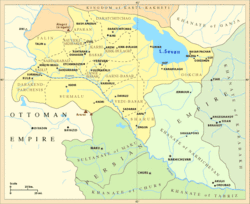納希切萬汗國
納希切萬汗國(波斯語:خانات نخجوان;亞塞拜然語:Naxçıvan xanlığı)是波斯附庸的高加索諸汗國之一[5],建於1747年,首府為納希切萬[6],其疆域包括今日亞塞拜然的納希切萬自治共和國與亞美尼亞的瓦約茨佐爾州。1827年最後一次俄罗斯-波斯战争中納希切萬汗國被俄羅斯帝國占領,隔年波斯被迫簽訂土庫曼恰伊條約將其割讓給俄羅斯,後者將納希切萬汗國與葉里溫汗國合併為亞美尼亞州。
納希切萬汗國 خانات نخجوان | |||||||||
|---|---|---|---|---|---|---|---|---|---|
| 1747年—1828年 | |||||||||
|
国旗 | |||||||||
 1800年的納希切萬汗國與葉里溫汗國領土 | |||||||||
| 地位 | 汗國(波斯附庸)[1] | ||||||||
| 首都 | 納希切萬 | ||||||||
| 常用语言 | 波斯语(官方語言)[2][3][4] | ||||||||
| 历史 | |||||||||
• 建立 | 1747年 | ||||||||
• 终结 | 1828年 | ||||||||
| |||||||||
歷史
编辑納希切萬汗國的領土過去屬於薩法維王朝的葉里溫省,在1603年-1618年奧斯曼-薩非戰爭期間受鄂圖曼帝國軍事威脅,波斯沙阿阿拔斯一世曾下令將當地人口遷往波斯本土[7]。1635年-1636年與1722-1736年當地曾兩度被鄂圖曼帝國佔領。阿夫沙爾王朝時期此地曾為葉里溫汗國的一部分,後來改由另一位汗統治,自成一汗國[8]。
1804-1813年俄罗斯-波斯战争中,俄軍將領伊萬·古多維奇一度占領納希切萬,後於1813年古利斯坦條約簽訂後歸還給波斯[9]。1827年最後一次俄罗斯-波斯战争時,卡札爾王朝儲君阿巴斯·米爾札任命伊赫桑·汗·坎加利為指揮官,據守納希切萬汗國戰略意義重要的要塞阿巴薩巴德堡,俄軍圍城後,伊赫桑汗私下與俄軍將領伊万·帕斯克维奇聯絡,於同年7月22日開城投降[10],1828年2月,波斯被迫簽訂土庫曼恰伊條約,將納希切萬汗國與其他阿拉斯河以北的領土割讓給俄羅斯帝國,後者將納希切萬汗國與葉里溫汗國合併為亞美尼亞州。伊赫桑汗改名為伊赫桑·汗·納希切萬斯基(Ehsan Khan Nakhichevansky)並成為俄軍將領,繼續擔任當地統治者[11]。
註釋
编辑- ^ Bournoutian, George A. The 1820 Russian Survey of the Khanate of Shirvan: A Primary Source on the Demography and Economy of an Iranian Province prior to its Annexation by Russia. Gibb Memorial Trust. 2016: xvii. ISBN 978-1909724808.
Serious historians and geographers agree that after the fall of the Safavids, and especially from the mid-eighteenth century, the territory of the South Caucasus was composed of the khanates of Ganja, Kuba, Shirvan, Baku, Talesh, Sheki, Karabagh, Nakhichivan and Yerevan, all of which were under Iranian suzerainty.
- ^ Swietochowski, Tadeusz. Russian Azerbaijan, 1905-1920: The Shaping of a National Identity in a Muslim Community. Cambridge: Cambridge University Press. 2004: 12. ISBN 978-0521522458.
(...) and Persian continued to be the official language of the judiciary and the local administration [even after the abolishment of the khanates].
- ^ Pavlovich, Petrushevsky Ilya. Essays on the history of feudal relations in Armenia and Azerbaijan in XVI - the beginning of XIX centuries. LSU them. Zhdanov. 1949: 7.
(...) The language of official acts not only in Iran proper and its fully dependant Khanates, but also in those Caucasian khanates that were semi-independent until the time of their accession to the Russian Empire, and even for some time after, was New Persian (Farsi). It played the role of the literary language of class feudal lords as well.
- ^ Homa Katouzian, "Iranian history and politics", Published by Routledge, 2003. pg 128: "Indeed, since the formation of the Ghaznavids state in the tenth century until the fall of Qajars at the beginning of the twentieth century, most parts of the Iranian cultural regions were ruled by Turkic-speaking dynasties most of the time. At the same time, the official language was Persian, the court literature was in Persian, and most of the chancellors, ministers, and mandarins were Persian speakers of the highest learning and ability."
- ^ William Bayne Fisher, Peter Avery, Ilya Gershevitch, Gavin Hambly, Charles Melville. The Cambridge History of Iran: From Nadir Shah to the Islamic Republic. Cambridge University Press, 1991. ISBN 0521200954, 9780521200950
- ^ Hewsen, Robert H. Armenia: a Historical Atlas. University of Chicago Press. 2001: map 149.
- ^ Oberling, P. Kangarlu. Encyclopedia Iranica. [2009-02-01]. (原始内容存档于2020-11-29).
- ^ Bournoutian, George A. (1992). The Khanate of Erevan Under Qajar Rule, 1795-1828. p. 32.
- ^ Записки о службе генерал-фельдмаршала графа И. В. Гудовича, составленные им самим. [2020-12-27]. (原始内容存档于2018-10-07) (俄语).
- ^ Ekbal, Kamran. ʿAbbāsābād. Encyclopedia Iranica. [2009-02-01]. (原始内容存档于2011-04-29).
- ^ Иванов Р. Н. Именем Союза Советских… Жизнь и гибель комбрига Нахичеванского. Герои Отечества. 2007.
參考文獻
编辑- Floor, Willem M. Titles and Emoluments in Safavid Iran: A Third Manual of Safavid Administration, by Mirza Naqi Nasiri. Washington, DC: Mage Publishers. 2008: 248. ISBN 978-1933823232.
- Oberling, P. 存档副本. Encyclopaedia Iranica, Vol. XV, Fasc. 5: 495. 2010 [2020-12-27]. (原始内容存档于2020-11-29).
|article=和|title=只需其一 (帮助)
